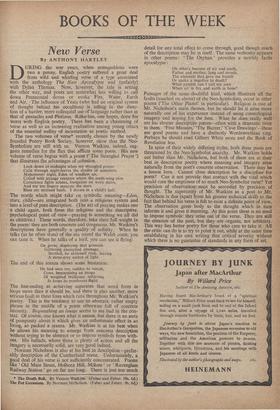New Verse
By ANTHONY HARTLEY DURING the war years, when armageddons were two a penny, English poetry suffered a great deal from wild and whirling verse of a type associated with the anthology The New Apocalypse and (unfairly) with Dylan Thomas. Now, however, the tide is setting the other way, and poets are somewhat less willing to call down Pentecostal doves or evoke Fire, Water, Earth and Air. .The influence of Yeats (who had an original system of thought behind his occultism) is telling in the direc- tion of a harder, more colloquial use of language rather than in that of pentacles and Plotinus. Rilke-has, one hopes, done his worst with English poetry. There has been a chastening of verse as well as an increasing realisation among young critics of the essential nullity of incantation as poetic method. The two volumes of verse* recently chosen by the newly founded Poetry Book Society, however, show that the Neo- Symbolists are still with us. Vernon Watkins, indeed, sug- gests remedies for the flux that afflicts some poets. His new volume of verse begins with a poem (` The Strangled Prayer ') that illustrates the advantages of cohesion.
Look down at midnight when my strangled prayer Calls through night-leaves the shades of ancestors, Midsummer night, Eden of windless air,
Coiled with strange creepers where the moth-wing stirs. Conscience fights echoes, footprints on worn stairs, And my ten fingers separate the stars.
Bless my strained heels. I drown in a child's hair.
The words which might take on symbolic meaning—Eden, stars, child—are integrated both into a religious system and into a level of pure description. (The act of praying makes one a child again, both from the religious and the descriptive. psychological point of view—praying is something we all did as children.) These words, therefore, take their full weight in . the poem: they are both concrete and congruous. Mr. Watkins's descriptions have ;generally a quality of solidity. When he talks (as he often does) of the sea round the Welsh coast, you can taste it. When he talks of a bird, you can see it flying:
On gorse, displaying that greenish Glittering enamelled plumage, Startled, he .skimmed rock, leaving A stone-grey socket of light.
The end of this stanza shows some hesitation:
He had seen me, sudden to vanish, Gone, bequeathing an image Of weighted brilliance, achieving In loops its ponderous flight.
The line-ending at achieving separates that word from in loops more than it should be, and there is also another, more serious fault in these lines which runs throughout Mr. Watkins's poetry. This is the tendency to use an abstract, rather empty phrase in the middle of a poem otherwise full of concrete intensity. Bequeathing an image seems to me bad in the con- text. Of course, one knows what it means, but there is an aura of pomposity about it which gives an unfortunate effect in .so living, so packed a stanza. Mr. Watkins is at his be when he allows his meaning to emerge from concrete description Without trying to be abstract or to impose symbols from with- out. His ballads, where there is plenty of action and all the imagery is necessarily solid, are very good indeed. detail for any total effect to come through, good though much of the description may be in itself. The same verbosity appears in other poems: The Orphan ' provides a terribly facile apocalypse: Oh what's become of air and earth, Father and mother, lung and mouth, The elements that gave me breath Or spoke a negative to death? What parents can l call my own When air is fire and earth is bone?
Passages of the same doubtful kind, which illustrate all the faults (touched on above) of the Neo-Symbolists, occur in other poems (`The Other Planet' in particular). Religion is. one of Mr. Nicholson's main themes, but he should let it arise more naturally out of his experience instead of using cosmological imagery and hoping for the best. What he does really well are his shorter descriptive pieces—often with a dramatic twist to them. 'Five Minutes,' The Buzzer; `Cave Drawings'—these are good poems and have a distinctly Wordsworthian ring. Perhaps he should read Gilbert White more and the Book of Revelation less.
In spite of their widely differing styles, both these poets are threatened by the Neo-Symbolist anarchy. Mr. Watkins holds out better than Mr. Nicholson, but both of them are at their best in descriptive poetry where meaning and imagery arise naturally from the poet's concrete observation. There may be a lesson here. Cannot close description be a discipline for poets'? Can it not provide that contact with the vital which would cure the emptiness of so much. Neo-Symbolist verse? Yet precision of observation must be seconded by precision of thought. The superiority of Mr. Watkins as a poet to Mr. Nicholson is due (apart from his greater technical skill) to the fact that behind his verse is felt to exist a definite point of view. The observation gives body to the thought which in turn informs it and gives it meaning. At this point there is no need to impose symbols: they arise out 'of the verse. They are still the creation of the poet, but they are organic, not arbitrary. This way lies better poetry for those who care to take it. All the critic can do is to try to point it out, while at the same time establishing in his own writing that critical severity without which there is no guarantee of standards in any form of art.


































 Previous page
Previous page